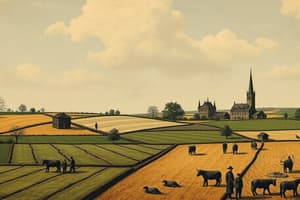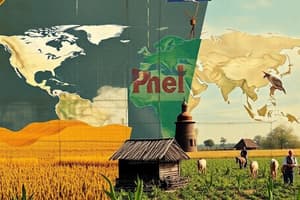Podcast
Questions and Answers
What were some valuable commodities in ancient Sumerians around 3000 BCE?
What were some valuable commodities in ancient Sumerians around 3000 BCE?
- Potatoes, tomatoes, and chickens
- Rice, corn, and pigs
- Apples, oranges, and cows
- Wheat, barley, and sheep (correct)
What did the accumulation of resources within certain areas and households lead to?
What did the accumulation of resources within certain areas and households lead to?
- Environmental conservation
- Resource depletion
- Technological regression
- Wealth accumulation (correct)
Which economic institutions were established as a result of the accumulation of resources?
Which economic institutions were established as a result of the accumulation of resources?
- Hospitals and research labs
- Museums and theaters
- Markets and trading centers (correct)
- Schools and libraries
Apart from changing how we live, what other transformations did agriculture set into motion throughout history?
Apart from changing how we live, what other transformations did agriculture set into motion throughout history?
Despite technological advances, why does agriculture remain crucial today?
Despite technological advances, why does agriculture remain crucial today?
What is one of the key impacts of agriculture mentioned in the text?
What is one of the key impacts of agriculture mentioned in the text?
How did agriculture influence population growth during early farming times?
How did agriculture influence population growth during early farming times?
What was a significant advantage of settled agriculture over hunter-gatherer lifestyles?
What was a significant advantage of settled agriculture over hunter-gatherer lifestyles?
How did the availability of abundant food in agricultural societies impact health compared to prehistoric times?
How did the availability of abundant food in agricultural societies impact health compared to prehistoric times?
What new economic opportunity emerged as a result of surplus food in agricultural societies?
What new economic opportunity emerged as a result of surplus food in agricultural societies?
Flashcards are hidden until you start studying
Study Notes
Agricultural Assumption
The term 'Agriculture' is used commonly today, often associated with farming and food production. However, its origins can be traced back thousands of years ago when humans first started cultivating plants and raising animals for sustenance. This change from hunter-gatherer lifestyles to agriculture marked a significant shift in human history.
Change in Lifestyle
With agriculture came a more stable way of life compared to hunting and gathering. Instead of moving constantly to find new sources of food, early farmers could stay in one place and grow their own crops or raise livestock. These developments allowed for population growth because people didn't have to spend all day searching for food; they could devote some time to other activities like building homes and making tools. It also opened up opportunities for trade since surplus food could be exchanged for goods produced by others.
Impact of Abundant Food
One key aspect of agricultural societies was the availability of abundant food, which led to better health. In contrast to prehistoric times where famine was common due to unpredictable weather patterns affecting wild plant seeds and animal populations, settled agriculture brought predictability and control over food sources. This change had cascading effects on society—people lived longer lives, had stronger immune systems, and were generally healthier overall.
Societal Changes
As agriculture developed further, it gave rise to complex political systems, social hierarchies, and urbanization. For example, in ancient Sumerians around 3000 BCE, crops such as wheat, barley, and sheep became highly valuable commodities. As these resources accumulated within certain areas and households, wealth accrued there too. Eventually, this led to the establishment of economic institutions like markets and trading centers.
In conclusion, the agricultural assumption has been a fundamental step forward in our species' development. It not only changed how we live but set into motion numerous other transformations throughout history - from societal structures to technological advancements. Today, despite advances in technology, agriculture remains crucial both globally and individually, providing us with sustenance while keeping alive traditions passed down through generations.
Studying That Suits You
Use AI to generate personalized quizzes and flashcards to suit your learning preferences.




